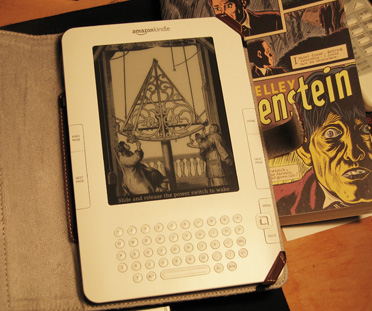 Popular Science magazine has put its entire 137-year history of issues online for free. In partnership with Google, the magazine is offering a search tool that will allow you to read anything it ever published. Here’s an example of a publisher who actually knows what it is doing in the 21st century. There are very few magazines staffed by people who understand which century they are playing in. Popular Science is apparently staffed by people who can read, write and tell time.
Popular Science magazine has put its entire 137-year history of issues online for free. In partnership with Google, the magazine is offering a search tool that will allow you to read anything it ever published. Here’s an example of a publisher who actually knows what it is doing in the 21st century. There are very few magazines staffed by people who understand which century they are playing in. Popular Science is apparently staffed by people who can read, write and tell time.
Category Archives: Technology
School Guy Brags About Watching Kids with Laptop Cameras
The show is called Digital Nation. This segment is called How Google Saved a School. Well, really? How did it? Come on now, Frontline. Let’s get real. There’s an assistant principal bragging on video about how he watches the students through their laptop cameras and finds out if they are using their computers inappropriately. Would it be inappropriate to stick one of his laptops straight up his smug geekster rear end? Because if I were one of these kids trying to learn in this nightmare of a prison school, that’s what I’d do and I’d just take the consequences as they came (that’s an insult, not an actual suggestion). But for now I’d recommend having a quick look at his hard drives to see exactly where he’s watching these kids. I’d certainly be curious. After all, he says the kids ‘use their laptops as a mirror,’ and that he watches them. Hmmm. Interesting, bud. How much time do you spend watching? There’s a school in Pennsylvania right now in all kinds of trouble with parents and the FBI because they are alleged to have been filming kids through laptop cameras in their own homes! That’s jail time, Ms. Principal lady. You spy on naked kids for any reason whatsoever and you get a free pass to the big house. No kidding.
These ‘educators’ are losing it in a bad way. If you’re watching a kid through a camera at school or in their home, you are one diseased nut-job and have no business being anywhere near children. Parents should not tolerate this sort of activity from a school or a school employee. They should call police in and create a very public stink. It is the job of a parent to very forcefully defend a child from this kind of surveillance.
Reading On a Kindle Is a Pleasure
 After two years of reading reviews, watching products come out and compete, listening to people gripe about DRM and ebook pricing, I jumped directly into the fray and opted for the Kindle from Amazon.
After two years of reading reviews, watching products come out and compete, listening to people gripe about DRM and ebook pricing, I jumped directly into the fray and opted for the Kindle from Amazon. I am completely and utterly smitten with the thing. It feels like a magic book. No – more like a printing press. It’s got ink inside and the computer arranges the ink on the screen and it feels a little bit like you’re printing each page as you look at it. It’s wonderful. I don’t think I’ve ever read so much in a two-day stretch before. I’ve subscribed to the New York Times and Asimov’s Science Fiction magazine. I’ve purchased a single Amazon ebook for $9.99 and I’ve downloaded some free books from Project Gutenberg. It all works beautifully and makes for the single best addition to my library since I acquired a two-hundred-year-old copy of Don Quixote.
Barnes & Noble Nook is a Dreadful Failure
 I’ve been so waiting with my bated breath and all for this magical Nook machine from Barnes & Noble. I was in a right dither tonight about an hour and a half ago as I shoved my reading glasses into my pocket, put my regular glasses on my face and piled into my car for the short ride to my nearest Barnes & Noble bookseller. But I stopped first at the Lenscrafters to run in and have them adjust my frames because my glasses are so new and have been drifting over lopsided all week. So the woman there fixed them up nicely and shined them good. Then I drove on toward my Nook encounter.
I’ve been so waiting with my bated breath and all for this magical Nook machine from Barnes & Noble. I was in a right dither tonight about an hour and a half ago as I shoved my reading glasses into my pocket, put my regular glasses on my face and piled into my car for the short ride to my nearest Barnes & Noble bookseller. But I stopped first at the Lenscrafters to run in and have them adjust my frames because my glasses are so new and have been drifting over lopsided all week. So the woman there fixed them up nicely and shined them good. Then I drove on toward my Nook encounter.
The store had a lone unit attached to an anti-theft device that scared the hell out of me because I tend to demonstrate new devices to myself until nearby customers think I’m a lunatic and I certainly didn’t want to raise any alarms. The Nook said, ‘Press the Power Button to Wake Up.’ I spun the device around several times until I located said button embedded in the upper edge of the Nook. I pressed it.
I waited.
Then I pressed it perhaps fourteen or fifteen times to try and make something wake up. Then the screen went through a series of blinks, flashes and some rather frightening symbols appeared and then disappeared. And then the machine said, ‘Press the Power Button to Wake Up.’
Film About Blue Brain: Attempt to Build a Working Brain Model
Using IBM computers, Dr. Henry Markram is building a model of the human brain that he hopes will take about 10 years to complete. Filmmaker Noah Hutton is chronicling the endeavor in an ongoing documentary that will be finished once the brain model exists. This is one of the most fascinating and important efforts I have ever heard about in modern science. The brain project is called Blue Brain and is located at École Polytechnique Fédérale de Lausanne. The idea to build a model based on minute and precise observations of how the brain synapses and cells actually work is a good one. Dr. Markram emphasizes that once you understand certain principles you can start to build models that increase in complexity and accuracy until you have have an understanding of how things work. Careful observation and exact mimicry will lead to a functioning model. Markram goes further to say that eventually you will be able to teach the model languages and watch it learn. He’s talking about artificial intelligence. He’s talking about making a machine think.
This is the modern world’s alchemy. The simplistic understanding of Medieval alchemy is that it was the attempt to turn base metals into gold. We are now trying to turn base metals into thinking beings. It is a logical thing to do. Think about it. Every household and every pocket in almost every developed nation on earth has a small thinking machine in it. What does that really tell you? It tells me that our main effort on a planetary scale – a human species level – is to make machines think. We aren’t going to the moon. Or going to Mars. Or trying to travel to the stars. What we’re actually doing is trying to make metal and electricity think. To live.
A working model of a brain is going to take us places we never thought we could go.
Amazon and Macmillan Raise eBook Prices
 There’s been a huge battle of the ebooks going on between Amazon.com and publisher Macmillan. Last week, Macmillan, in response to rotten Apple’s announcement of $14 and $15 ebooks on its new iPad, insisted that Amazon give Macmillan the right to choose its own higher ebook pricing for the Kindle ereader device. Amazon got peevish about the deal and simply de-listed all of Macmillan’s books. I thought that was a nice nasty smack in the kisser for a doomed publisher at the time. I was feeling so good about Amazon and its Kindle and so snitty about Apple’s iPad that I was within 60 minutes of plunking my digital money down on a brand new shiny Kindle. But wait! Amazon caved! They rolled over and gave Macmillan what it wanted.
There’s been a huge battle of the ebooks going on between Amazon.com and publisher Macmillan. Last week, Macmillan, in response to rotten Apple’s announcement of $14 and $15 ebooks on its new iPad, insisted that Amazon give Macmillan the right to choose its own higher ebook pricing for the Kindle ereader device. Amazon got peevish about the deal and simply de-listed all of Macmillan’s books. I thought that was a nice nasty smack in the kisser for a doomed publisher at the time. I was feeling so good about Amazon and its Kindle and so snitty about Apple’s iPad that I was within 60 minutes of plunking my digital money down on a brand new shiny Kindle. But wait! Amazon caved! They rolled over and gave Macmillan what it wanted.
So now, dear reader, your Kindle ebooks from Macmillan will cost more. Frankly, I was always kind of miffed by the whole $9.99 price tag on Kindle ebooks. Too high. Ebooks are invisible. You can’t stack them and put boards across to make a coffee table. Ebooks don’t have nice covers or fancy paper that you can bend and spill coffee on. I don’t know about anyone else reading this blog out there, but when I walk into a book store I’m just a customer. I don’t frankly give a damn about how the publisher is doing or how Amazon is getting along, or care a whit for Steve Jobs’ health, or the status of your average mid-list author and how he or she’s going to pay their mortgage. I don’t give one syllable of a damn. Continue reading